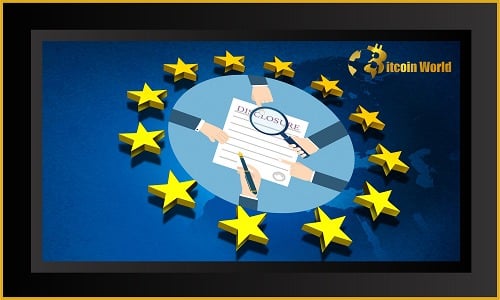Are you concerned about your crypto privacy in Europe? You’re not alone! A coalition of 46 European crypto businesses and groups has voiced serious concerns over proposed EU regulations on crypto transaction disclosures. They’ve penned a letter to 27 EU finance ministers, urging them to reconsider rules they believe go too far and could stifle the burgeoning crypto industry. Let’s dive into what’s causing this stir!
Why Are Crypto Businesses Worried About EU Regulations?
At the heart of the matter is a proposed requirement for crypto businesses to gather extensive information on individuals involved in digital currency transactions. These businesses, in their letter dated April 13th, argue that these new rules exceed the existing international standards set by the Financial Action Task Force (FATF). They fear these stringent measures could have significant negative consequences. What exactly are their concerns?
- Privacy Risks: The businesses argue that demanding public disclosure of transaction details and wallet addresses would severely compromise the privacy and safety of crypto holders. Imagine your every crypto move being potentially exposed!
- Stifling Innovation: They believe overly complex and strict regulations, like those currently in Europe, are already hindering the growth and expansion of crypto companies within the region. Is Europe risking falling behind in the global crypto race?
- Impact on Decentralized Finance (DeFi): A key point of contention is the potential impact on decentralized projects. The crypto firms are specifically requesting the EU to exempt decentralized finance (DeFi) projects from legal entity registration requirements. They also argue that the Markets in Crypto Assets (MiCA) framework shouldn’t apply to certain decentralized stablecoins.
What is MiCA and Why Does It Matter?
MiCA, or Markets in Crypto Assets, is the EU’s landmark regulatory framework designed to govern cryptocurrency issuers and service providers across the European Union. Recently approved by the European Parliament, MiCA aims to bring clarity and regulation to the crypto space within the EU. While the crypto industry generally welcomes regulation to foster trust and growth, the current concerns highlight a delicate balance – regulation versus innovation and privacy.
One crucial aspect that was debated within MiCA was a potential ban on proof-of-work cryptocurrencies. Thankfully, this was ultimately removed from the final version. However, the current dispute over transaction disclosure shows that the regulatory journey is far from over.
Industry Leaders Speak Out
Jean-Marie Mognetti, CEO of Coinshares and one of the letter’s organizers, points out that European crypto regulations are already more burdensome compared to other parts of the world. She stresses that these strict rules are acting as a brake on company growth in Europe. This raises a critical question: Is Europe creating an environment that encourages crypto innovation or one that pushes businesses elsewhere?
Diana Biggs, chief security officer at Defi Technologies and another key organizer, highlights a lack of coordinated effort within the European crypto industry to advocate for sensible regulation. According to Biggs, “There hasn’t been strong enough or coordinated efforts across our industry in Europe.” This unified letter represents a significant step towards a more coordinated voice.
Key Takeaways:
- Privacy Concerns are Paramount: The core issue revolves around protecting the privacy of crypto users. Overly intrusive disclosure requirements could deter adoption and push users towards less regulated environments.
- Balancing Regulation and Innovation is Crucial: The EU aims to regulate crypto, but it must do so in a way that doesn’t stifle innovation and drive businesses away. Finding the right balance is key to Europe becoming a thriving crypto hub.
- DeFi and Decentralization Need Consideration: The unique nature of DeFi and decentralized stablecoins requires specific consideration in regulatory frameworks. Applying traditional financial regulations directly may not be appropriate or effective.
- Industry Collaboration is Essential: The unified voice of 46 crypto businesses demonstrates the power of industry collaboration in shaping effective and balanced regulations.
What’s Next?
The letter from these crypto businesses is a clear call for dialogue and reconsideration. It remains to be seen how EU finance ministers will respond. The outcome will significantly impact the future of the crypto industry in Europe. Will regulators heed the industry’s concerns and strive for a more balanced approach? The crypto world is watching!
Related Posts – Ex-SEC Chair, Jay Clayton Believes Cryptocurrency Industry Is For Long Haul
Disclaimer: The information provided is not trading advice, Bitcoinworld.co.in holds no liability for any investments made based on the information provided on this page. We strongly recommend independent research and/or consultation with a qualified professional before making any investment decisions.


